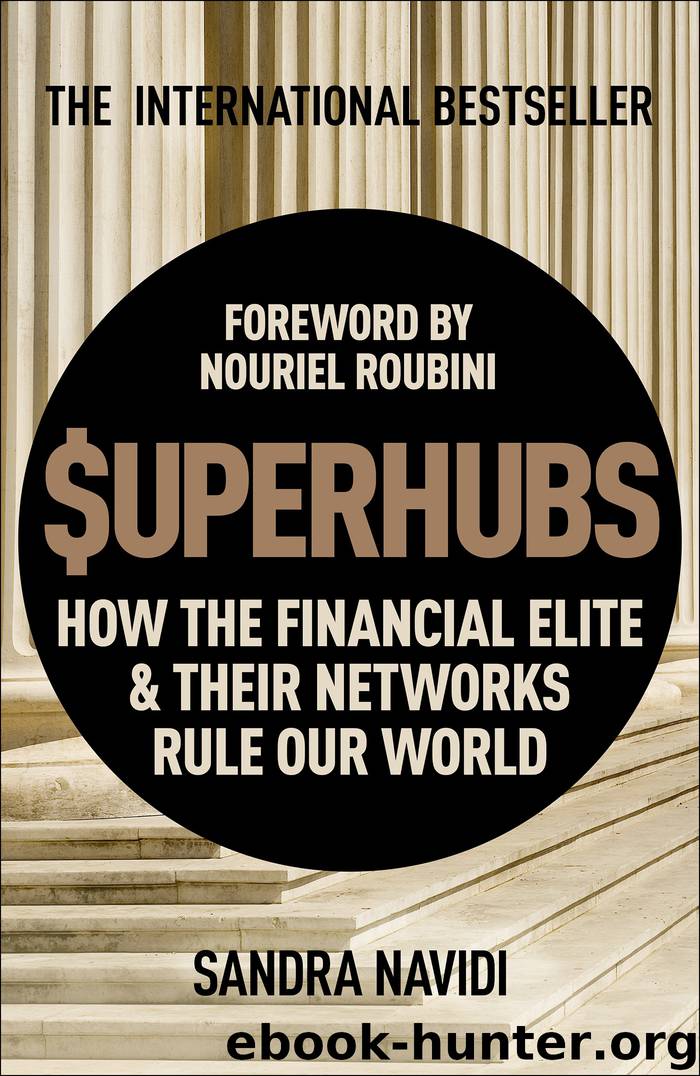Superhubs by Sandra Navidi

Author:Sandra Navidi
Language: eng
Format: epub
Publisher: Nicholas Brealey Publishing
Published: 2015-12-31T16:00:00+00:00
STRESS TEST: WHEN BEING A SUPERHUB IS NOT SO SUPER
As glamorous as it appears from the outside, being a superhub comes at a price. Top finance executives live in a rarefied and insular world rich in prestige, privileges, and pecuniary rewards. However, those rewards require sacrifices and trade-offs, and the negative risks are dizzyingly high. The tough culture behind the sparkly facade of financial firms manifests itself in phrases popular in the financial world such as, “You are only as good as your last deal,” “What have you done for me lately?” and “You eat what you kill.” Recruiters give promising young professionals the star treatment and seduce them with prestigious and high-salaried job offers. Initially, the stimulating environment is invigorating, and the strong culture and camaraderie provide a sense of community, purpose, and importance. However, the unpredictability of staying on call 24/7—without any control or ability to set boundaries—eventually takes a toll. The world of finance is a way of life, an all-or-nothing culture where either you’re in or you’re out; either you play the game or you sit on the sidelines. In strict hierarchical structures with military-style discipline, everyone must pay their dues, often at the expense of personal lives and relationships.
Many executives, being workaholics and travelholics, take refuge in pills and stimulants to compensate for perpetual sleep deprivation. One private equity billionaire, who constantly circles the globe in his private jet, told me that he couldn’t survive without sleeping pills. The financial crisis only exacerbated these pressures. Ten percent of Wall Street jobs were cut, yet the workload essentially remains the same. Meanwhile, the zeitgeist has changed, and previously customary business practices are now considered unethical or illegal. Competition for clients and deals has become ever more cutthroat, while increased regulatory scrutiny and new bureaucratic compliance rules add a tedious and burdensome layer to the workload. Many people do not last long past the age of forty, and many break into the profession only to make as much money as possible before getting out as soon as possible. The average duration of an investment banker’s job is seven to nine years.3
I have personally witnessed the glorification of being overworked and underslept, the celebration of exhaustion and deification of those who could boast the most all-nighters. In this testosterone-dominated, “my bonus is bigger than yours” culture, the ability to live on virtually no sleep is equated with being a high performer. When bankers say “nine to five,” they don’t typically mean five in the afternoon, but five o’clock the next morning. One of the most annoying features of this environment is “face time”: staying at work even if there is nothing to do, simply for the sake of demonstrating your undying loyalty to the organization. Due to competitive pressures, no one wants to be the first one to leave, so everyone stays late trying to look busy. Then there is the “magic roundabout”: A town car takes you home and waits with engine running while you shower and change, only to take you directly back to work.
Download
This site does not store any files on its server. We only index and link to content provided by other sites. Please contact the content providers to delete copyright contents if any and email us, we'll remove relevant links or contents immediately.
The Black Swan by Nassim Nicholas Taleb(7129)
Bad Blood by John Carreyrou(6621)
Pioneering Portfolio Management by David F. Swensen(6300)
Millionaire: The Philanderer, Gambler, and Duelist Who Invented Modern Finance by Janet Gleeson(4478)
Skin in the Game by Nassim Nicholas Taleb(4248)
The Money Culture by Michael Lewis(4207)
Bullshit Jobs by David Graeber(4190)
Skin in the Game: Hidden Asymmetries in Daily Life by Nassim Nicholas Taleb(4007)
The Wisdom of Finance by Mihir Desai(3747)
Blockchain Basics by Daniel Drescher(3583)
Liar's Poker by Michael Lewis(3449)
Fooled by Randomness: The Hidden Role of Chance in Life and in the Markets by Nassim Nicholas Taleb(3124)
Hands-On Machine Learning for Algorithmic Trading by Stefan Jansen(3072)
Mastering Bitcoin: Programming the Open Blockchain by Andreas M. Antonopoulos(3045)
The Intelligent Investor by Benjamin Graham Jason Zweig(3041)
The Power of Broke by Daymond John(2988)
Investing For Dummies by Eric Tyson(2954)
You Are What You Risk by Michele Wucker(2837)
Bull by the Horns: Fighting to Save Main Street From Wall Street and Wall Street From Itself by Sheila Bair(2773)
